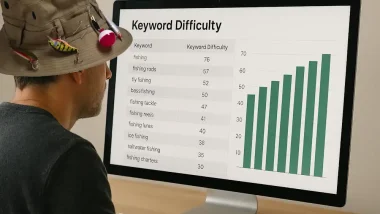Keyword stuffing is the practice of excessively repeating keywords in a webpage’s content, metadata, or backlink anchor text in an attempt to manipulate search engine rankings.

In the early days of search engine optimization (SEO), keyword stuffing was a common tactic used by webmasters to boost their site’s visibility. However, search engines have long since caught on to this black hat SEO technique, and now, keyword stuffing can do more harm than good.
How Keyword Stuffing Works
Keyword stuffing involves unnaturally repeating target keywords throughout a webpage’s content, often to the point where the text becomes difficult to read.
This can include inserting irrelevant keywords or hiding keywords using tactics like white text on a white background or placing them in a page’s metadata. The goal is to manipulate search engines into thinking the page is more relevant for those keywords than it actually is.
The Consequences of Keyword Stuffing
Search engines, particularly Google, have sophisticated algorithms that can detect and penalize websites engaged in keyword stuffing. Major algorithm updates like Google’s Panda and Penguin specifically target low-quality content and manipulative linking practices, which can result in a significant drop in search rankings or even a complete ban from search results.
Poor User Experience
Keyword stuffing also leads to a poor user experience. Unnaturally repeating keywords makes content hard to read and understand, leading to higher bounce rates as users quickly leave the site in frustration. Over time, this can damage a brand’s reputation and erode trust with potential customers.
Here’s an example of the excessive use of the keyword “best running shoes”:
Looking for the best running shoes? Our store has the best running shoes for every type of runner. Whether you need the best running shoes for long distances, the best running shoes for trails, or the best running shoes for speed, we’ve got you covered. Our selection of the best running shoes includes top brands known for making the best running shoes on the market. Don’t settle for anything less than the best running shoes – shop our store today for the best running shoes money can buy!
Ugh! In this example, the keyword “best running shoes” is repeated unnaturally throughout the paragraph, making it difficult to read and signaling to search engines that the content may be trying to manipulate rankings rather than provide value to users.

Here’s another example, this time using the keyword “dog toys” excessively:
Welcome to our dog toys page, where you’ll find the best dog toys for your furry friend. We have dog toys for small dogs, dog toys for large dogs, and dog toys for every size in between. Our dog toys are made from high-quality materials, so you can trust that these dog toys will withstand even the toughest chewers. From squeaky dog toys to plush dog toys to interactive dog toys, we have all the dog toys you need to keep your pup entertained. Shop our collection of dog toys today and treat your dog to the best dog toys around!
Again, the repetition of “dog toys” makes the text sound unnatural and spammy, providing a poor user experience and likely triggering search engine filters designed to detect keyword stuffing. (I hope these examples don’t trigger a keyword-stuffing penalty on this site!)
Best Practices for Keyword Optimization
Instead of resorting to keyword stuffing, focus on creating high-quality, user-centric content that naturally incorporates relevant keywords. Conduct thorough keyword research to identify the terms and phrases your target audience is using, and use those keywords in context throughout your content, including in metadata and header tags.
Using variations and long-tail keywords can also help you avoid overusing a single keyword while still signaling relevance to search engines. Above all, prioritize creating valuable content that meets the needs of your users.
To avoid keyword stuffing while still optimizing your content for best results, here are four key points:
- Monitor the keyword density of each page on your website. The exact number varies based on the length of your page but should generally be between 1% – 2%.
- Don’t focus solely on one specific primary keyword in every part of the content you create. Instead, use variations of it or related terms throughout both body text and headings.
- Pay attention to how words appear naturally in sentences rather than trying to force them into places where they don’t belong; this will make sure that your pages read well and flow logically from paragraph to paragraph.
- Make sure your content provides useful information for readers instead of being stuffed with unnecessary keywords just for SEO purposes.
By keeping these guidelines in mind as you write, you’ll be able to ensure that your web pages have a good balance between natural language and targeted phrases without going overboard on either side!
Alternatives to Keyword Stuffing
Effective SEO involves a wide range of tactics beyond keyword optimization. Content marketing and link building can help attract valuable backlinks and establish your site as an authoritative resource in your industry. User engagement signals like comments, shares, and low bounce rates can also positively impact your search rankings.
Technical SEO improvements, such as optimizing your site’s speed and mobile-friendliness, can also boost your visibility in search results without resorting to manipulative tactics like keyword stuffing.
Penalties and Recovery
Websites that engage in keyword stuffing often see a sudden drop in search traffic, especially after a major algorithm update. In contrast, websites that focus on creating valuable content and building genuine relationships with their audience are more likely to weather algorithm changes and maintain their search visibility over time.

If your website has been penalized for keyword stuffing, here are some steps you can take to recover:
- Remove or rewrite stuffed content: Go through your website and identify pages where keywords have been used excessively. Either remove these pages entirely or rewrite the content to use keywords naturally and in context.
- Optimize meta tags: Ensure that your meta titles and descriptions are unique, relevant, and not stuffed with keywords. Use modifiers and long-tail variations to avoid repetition.
- Submit a reconsideration request: If your site has been manually penalized, fix the issues and submit a reconsideration request to Google or other search engines, explaining the changes you’ve made to comply with their guidelines.
- Monitor your progress: Keep an eye on your search rankings and traffic after making changes. It may take some time for your site to recover, but consistent improvements to your content and SEO practices should eventually pay off.
Keep in mind that recovering from a keyword stuffing penalty will take time and effort. It’s essential to be patient and consistent in your efforts to improve your website and regain the search engines’ trust.
Final Thoughts
Keyword stuffing is an outdated and ineffective SEO tactic that can severely damage your website’s search rankings and reputation. By focusing on creating high-quality, user-centric content and employing ethical SEO practices, you can improve your search visibility and attract more qualified traffic to your site. Remember, the best way to succeed in SEO is to prioritize your users’ needs above all else.

